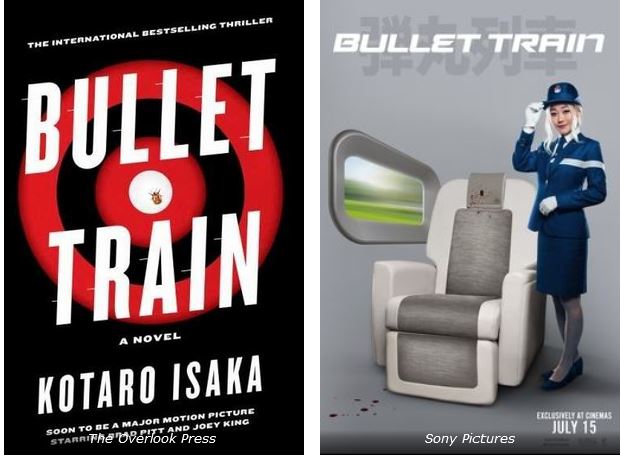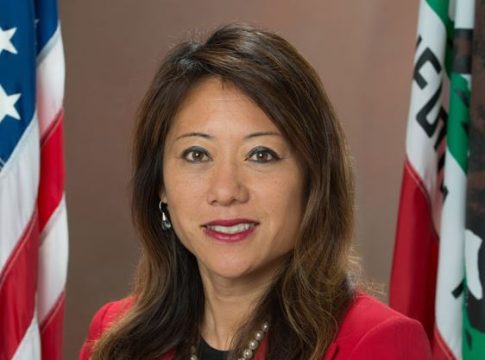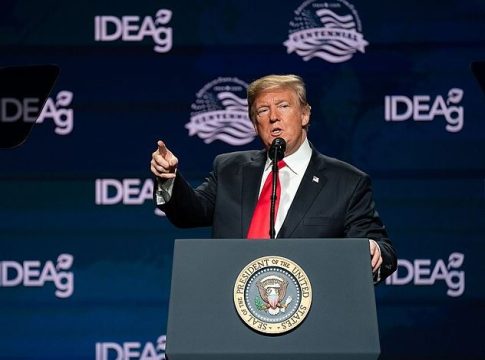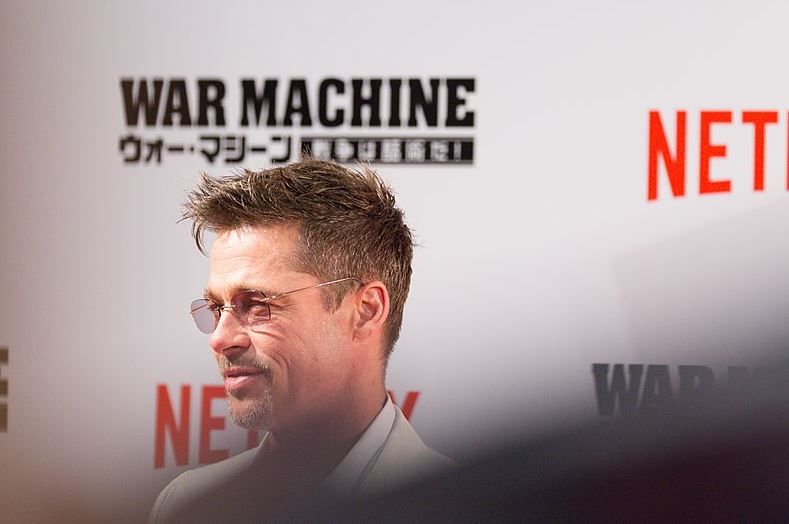By Rachel Tao, AsAmNews Intern
(Originally published March 23, 2022, Bullet Train is set to hit theaters Friday August 5)
There has been recent discussion about whether the movie Bullet Train, starring Brad Pitt and premiering this July, is whitewashed or perpetuates fetishization of Japanese culture. While some fans are excited to see Kōtarō Isaka’s popular Japanese novel Maria Beetle adapted to film, others, including the Japanese American Citizens League, have raised concerns about whether the book has been adapted in a positive way for Asian representation in Hollywood.
Bullet Train is a Sony Pictures action comedy film directed by David Leitch, who has previously directed Deadpool 2 and Fast & Furious Presents: Hobbs & Shaw, reports Deadline. Zak Olkewicz wrote the script based on Maria Beetle, a novel originally published in 2010 to best-selling success in Japan. According to a book review by Michael Popple, “Maria Bītoru (Maria Beetle), is a unique and clever thriller which follows five very unusual killers who find themselves aboard the same ill-fated train ride.” The movie has a similar premise: an aging assassin is given a last mission to complete while on a bullet train. He meets other competing assassins on the train, and they realize their missions are connected.
The cast ensemble includes stars like Brad Pitt, Joey King, Bad Bunny, Aaron Taylor-Johnson, and Sandra Bullock. There are Japanese actors in the ensemble as well, namely Andrew Koji, Hiroyuki Sanada, Masi Oka, and Karen Fukuhara. However, examining IMDb, it seems all of them have side roles, except for Koji, who plays one of the five assassins.
LATEST STORIES
AsAmNews spoke to David Inoue, Executive Director of the Japanese American Citizens League, to get his thoughts on the matter.
When asked about the allegations of whitewashing, Inoue responded, “I absolutely think charges of whitewashing are accurate as this is a story based around what were originally Japanese characters and it remains set in Japan. Foreigners, or gaijin, remain a distinct minority in Japan, and to populate the movie with so many in the leading roles is ignoring the setting.”
“A more accurate way of doing Bullet Train would have been to set it on the Acela Express from Washington, DC to New York, though it would have been a much slower movie,” he added.
Inoue said non-Asian actors in the movie “should be questioned on their allyship with the Asian community. To see a film set in Japan with Japanese characters only as the background is offensive, and some of them should have been asking questions about this. Someone of Brad Pitt’s stature has the ability to do that and he failed to say anything.”
There is no doubt that the movie will have success internationally, particularly considering the incredible popularity of Brad Pitt, or “Burapi,” in Japan.
Inoue reflected, “Interestingly, with Pitt’s popularity in Japan, his casting will be welcome in Japan and probably will result in a better box office return there than had an Asian, or even a Japanese actor been cast. I can imagine some would make the argument that the best actors for the roles were cast, but that needs to be a two-way street. That excuse can’t just be used to cast non-Asian actors in what is more likely to be Asian roles if it does not also result in Asian actors being cast in roles that would more likely be thought of as White or other ethnicities.”
The cast’s racial makeup is particularly unsettling for Inoue because it endorses the long-held notion in Hollywood that Asians cannot effectively portray main characters in films. “This movie seeks to affirm the belief that Asian actors in the leading roles cannot carry a blockbuster, despite all the recent evidence indicating otherwise, beginning with Crazy Rich Asians and extending to Shang Chi.”
Yuma Terada and Ryosuke Saegusa, co-founders of management company CTB, Inc., played an important part in enabling this big-budget adaptation. Hollywood generally has little access to Japanese stories because of literary copyright discrepancies between American and Japanese law; CTB’s mission is to significantly streamline the acquisition process of Japanese rights. Thus, they signed the film deal with Sony granting them the Japanese IP to Maria Beetle. Additionally, they sold the English-language publication rights of the novel to Harvill Secker, allowing Isaka’s writing to be read in English for the first time.
In an interview with The Hollywood Reporter, Terada said that despite the novel’s enormous success in Japan in 2010, it “was unknown in Hollywood until we developed a pitch based on the novel, which immediately attracted multiple bids.” He asserted that they have pursued this adaptation with Isaka’s blessing.
When asked about how closely adapted the novel would be, Saegusa commented, “The movie will of course stray from the novel, as it should, in order to create the best possible cinematic experience. Creatively, we are not against such adaptation.”
Terada added, “We don’t necessarily believe that movie role must always be played by actors or actresses whose ethnicities correspond to the characters as written in the screenplay or the underlying novel. We also believe the novel and the movie are two separate things… I do believe that in the case of Bullet Train the movie, the ethics of representation are being taken into careful consideration.”
How far detached the movie is from the novel certainly has a substantial impact on how whitewashed it is perceived to be. Of the five main assassins, Pitt and King’s character names have been clearly changed from the original characters’ names; their names in the movie are “Ladybug” and “the Prince” respectively, though the characters themselves seem to be similar to the original characters. In 2020, there were rumors circulating that Joey King, of The Kissing Booth fame, had been cast as Katara in Netlix’s Avatar: The Last Airbender live-action series. According to Seventeen, King responded, “I do not believe a white woman should play a character of color. Not me or any other white woman for that matter.”
When the trailer was released, there were clear blunders noticed by those familiar with Japanese culture. Japan Today published a rundown of some of the inaccurate details, including that there are no quiet cars on bullet trains and that a sign shown has incorrect Japanese characters.
“The Japan in the movie is an amped-up version of the real thing, featuring all sorts of ‘Cool Japan’ elements you’d expect a big Hollywood version to latch onto,” Oona McGee wrote. “Demon masks? Check. Polite trolley cart lady on the bullet train? Check. A walk through Akihabara at night? Check. Sakura petals falling upon yakuza with samurai swords? Check.”
Isaka shared a handwritten Japanese message on Twitter in response.
映画『#ブレット・トレイン』の原作「マリアビートル」を執筆した作家の #伊坂幸太郎 先生よりコメントが到着🖊 pic.twitter.com/FqduDHZU6Y
— 映画『ブレット・トレイン』公式アカウント (@BulletTrainJP) March 2, 2022
In English, the message reads, “What’s this Japan!? Even though I was surprised, I was excited by the gorgeous actors and their energetic, violent scenes! I hope it will be a fun movie that will drive away dark feelings!”
Some Japanese citizens seem to agree that although the trailer is not what they expected, they are still eager to see it. “It’s different from my imagination, but I want to see it!” commented one JapanToday reader. “It has a completely different atmosphere to the original, but I’m looking forward to it,” wrote another.
AsAmNews also spoke with Milton Liu, the Interim Executive Director of the Asian American Media Alliance (formerly the Asian Pacific American Media Coalition). Here, Liu is only representing his own viewpoints as an Asian American writer, producer, and director, not the organization as a whole.
He emphasized that he would need to see the movie to judge whether it has been whitewashed, saying, “I would have to screen the film to have an informed opinion.”
He was hesitant to make a judgment without seeing the movie. “Obviously, there’s a slippery slope of what is whitewashing, what is not, what is racially offensive, what is story-telling or creative license, and so forth… The author has approved this, and the production company that licensed this deal is a Japanese company that’s trying to get into using Japanese IP for the western world. Not to say that those two things make it okay, but at least that’s the right course; it’s not some Hollywood White producer going out to Japan and finding the IP and really making it a whitewashed adaptation,” he said.
Since Pitt and King’s character names have been changed, Liu believes the film-makers are not necessarily whitewashing but perhaps more intentionally changing the ethnicity of the characters for a Western audience. He juxtaposed the movie to Scarlett Johansson’s 2017 sci-fi film Ghost in the Shell, in which Johansson plays a Japanese character with a Japanese name, and Emma Stone’s 2015 rom-com Aloha, in which Stone plays a half-Asian character. In his opinion, those films are more clearly problematic.
He acknowledged that this change of ethnicity in the main roles of Bullet Train is not valuable for Asian representation in Hollywood. He also called attention to the nuances of the Japanese characters in the film–it matters not just whether they are inside roles but what those side roles are as well. “If all of these side characters and villains are Asian, that’s definitely a bad look,” he told AsAmNews. It is vital to note that the main characters of the story were Westernized but not the side characters and villains.
Liu added, “I don’t think there’s a good portrayal of an Asian woman who has any kind of pertinence in the trailer.” The only woman who is an especially important part of the plot is King, and the only Japanese woman in the trailer is a deferential server Pitt asks for a drink from.
“So that’s the question more than whitewashing, is the fetishization of Asian culture being ‘exotic’ when they just side notes to the story,” Liu concluded. “That’s the issue that could be troublesome for this film.”
He discussed deeper concerns about the trailer. “Seeing the trailer, there’s a lot of fetishization of Asian culture and Japanese culture in particular–the samurai, the samurai swords, the Japanese Noh masks. I don’t know what context that’s in, but that’s not a great look.”
These reflections are strongly echoed by Inoue, who stated, “Based on what can be seen in the trailer, it is more a caricature of Japan than a Japanese setting.” He called out specific details: “It has the stereotypical neon Tokyo backdrop and the obligatory shot of ominous-looking yakuza with their swords at the ready. It’s not just the characters who have been whitewashed, it is a whitewashed image of Japan. None of the shinkansen that I have ever ridden look anything remotely like the train in the movie. It carries out the trope of exoticized Japan to an extreme. All they need to do is add in some Geisha to make the caricature complete.”
“It is no longer a Japanese story,” he declared.
One host of the podcast Small Talk Japan said, “It’s so weird because it’s basically a Hollywood movie that’s just set in a Japanese theater. Hollywood does this all the time–they fly these White actors and actresses into environments that they’re not natively from, and then they show a story.” He commented on the beauty of the trailer, saying he was looking forward to the movie, but continued, “I know what they’re doing, and it’s hilarious that they’re doing it so obviously.”
Underlying these observations is a question of why it was necessary to bring on so many non-Asian actors to the adaptation of an Asian story. While many will agree that a movie of Pitt as an assassin in Japan is incredibly appealing, one has to wonder how much more appealing a faithful adaptation of Maria Beetle with more Japanese actors could be.
Sony Pictures and CTB, Inc. did not respond to repeated requests from AsAmNews for comment.
AsAmNews has Asian America in its heart. We’re an all-volunteer effort of dedicated staff and interns. Check out our new Instagram account. Go to our Twitter feed and Facebook page for more content. Please consider interning, joining our staff, submitting a story or making a financial contribution.











Horrible racist movie the one black person is a clown and whoever parents of the child who looks like buckwheat, you should be ashamed of yourself., please read a book, like the Bible, or some of their history books, that tell you how they treated our people. You are dumb to do anything for money. Awful movie.
I’m from the UK.
If Japanese actors filmed in London, Oxford and Windsor (their version of a UK story), I wouldn’t have a problem with it. In fact, I would welcome them to film in the UK.
The fact that Inoue has a problem suggests he is the racist one.
What you can’t accept is that it becomes a major international film and box office draw with these actors, as opposed to a regional art film, however good it might have been.
The money men decide the best product for the film and they instruct. If you think you have an international market for a flabby budget action film with only Japanese actors speaking Japanese, go right ahead mate and become a producer. Finance it.
Until that time, accept the reality that Hollywood won the international cinema war long ago.
And calm down. It’s art. Entertainment. It’s not a sociology essay.